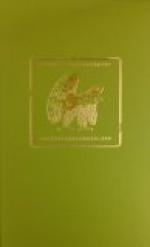She took the paper and started buoyantly to the secretary, but the little man stopped her. “Read it over, read it over,” he cautioned. “All square, isn’t it? And sign this duplicate, too. That’s right. You’re quite a business woman.”
He laughed his high, mirthless laugh, and, taking a check from the bill-book, added some bright gold pieces which he stacked on the table carefully beside the package he had brought. “There’s your three thousand,” he said.
“It’s out of a little bunch of dust I just turned in at the assay office.”
“Thank you.” She stood waiting while he folded his duplicate and put it away, but he did not rise to go, and after a moment, she went back to her chair by the scarlet azalea.
“They are doing really wonderful things in the Wenatchee Valley,” she said graciously, willing to make conversation in consideration of that little pile of clean, new coin that had come so opportunely, “the apples are marvelous. But”—and here her conscience spoke—“you understand this tract is unreclaimed desert land; you must do everything.”
“Yes, ma’am, I understand that; but what interests me most in that pocket is that it belonged to David Weatherbee. He mapped out a project of his own long before anybody dreamed of Hesperides Vale. He told me all about it; showed me the plans. That piece of ground got to be the garden spot of the whole earth to him; and I can’t stand back and see it parcelled out to strangers.”
He paused. The color deepened a little in her face; she looked away through the west window. “I thought an awful lot of Dave,” he went on. “I’d ought to. Likely you don’t know it—he wasn’t the kind to talk much about himself—but I owe my life to him. It had commenced”—he held up the crippled hand and smiled grimly—“when Dave found me curled up under the snow, but he stayed, in the teeth of a blizzard, to see me through. And afterwards he lost time, weeks when hours counted, taking care of me,— operated when it came to it, like a regular doctor, my, yes. And when I got to crawling around again, I found he’d made me his partner.”
“He had made a discovery,” she asked, “while you were ill?”
“Yes, and you could bank on Dave it was a good one. He knew the gravel every time. But we had to sell; it was the men who bought us out that struck it rich. You see, Dave had heavy bills pressing him down here in the States; he never said just what he owed, but he had to have the money. And, my, when he was doing the bulk of the work, I couldn’t say much. It was so the next time and the next. We never could keep a claim long enough for the real clean-up. So, when I learned to use my hand, I cut loose to try it alone.”
He halted again, but she waited in silence with her face turned to the harbor. “I drifted into the Iditarod country,” he went on, “and was among the first to make a strike. It was the luckiest move I ever made, but I wish now I had stayed by Dave. I was only a few hundred miles away, but I never thought of his needing me. That was the trouble. He was always putting some other man on his feet, cheering the rest along, but not one of us ever thought of offering help to Dave Weatherbee. A fine, independent fellow like him.




